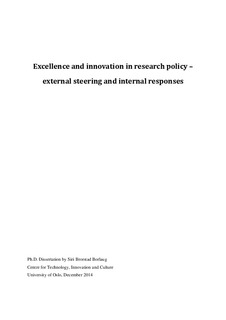| dc.description.abstract | The past two decades have seen a number of transnational governance instruments aiming for excellence and innovation in research. This thesis examines three instruments adopted by several OECD countries: Centres of Excellence (CoEs), Centres of Excellence in Innovation and Research (CoEIRs), and third mission legislation. Reasoning primarily from institutional theory the thesis investigates how these instruments are translated and adapted to the public research systems of Norway and Sweden, and how and to what extent they affect university researchers’ identities and practices. The thesis applies a multilevel analysis and a qualitative research design using documents studies and interviews.
The thesis shows that although policy aims and rhetoric have been the same in both countries, the instruments have had different impacts on the respective researchers. These differences are traced to the means and the goals of the instruments, the composition and design of the public research systems, and institutions conditioning the researchers’ environment.
One general finding is that the third mission legislation has had little impact on researchers’ identity and practices as it affords researchers room for their own interpretation of the legislation's content and what it means for them. Another finding is that centre schemes have the propensity to intertwine with researchers’ identity and practices by imposing new ways of organising research, albeit under certain conditions. The thesis shows that the high level of block funding of the universities combined with a segmentation of research practices between the university and the research institute sector in Norway, has contributed to the legitimisation of the centres in the universities. By having the goal of excellence which complies with academic norms and values, the centre schemes legitimise a concentration of funding on the best research group – an otherwise highly contested action in a research system characterised by equality in the distribution of funds. The schemes furthermore provide the opportunity to cross organisational and institutional boundaries. Similarly, the centre scheme with the goals of excellence and innovation offers the opportunity to bridge the logics of innovation and excellence and therefore legitimise practices associated with innovation. The Swedish public research system is characterised by competitive funding and a relatively small research institute sector. The centre schemes have a relatively limited role in inducing collaboration across organisational and institutional boundaries. Rather, they compete with other grants for the researchers’ attention, which seems to impede the institutionalisation process.
Other factors also explain the perceived variance in the impact of the centre schemes on researchers’ identities and practice. These are, inter alia, the identity and the maturity of the academic field, the ripeness of the relationship between the university researchers and the industrial/public partners, and researchers’ job descriptions.
Taking all factors together, the thesis demonstrates that the adoption of transnational governance instruments does not necessarily lead to convergence between national research systems; the instruments may rather strengthen the national characteristics. Furthermore, the thesis illustrates the importance of examining governance instruments on both the micro and the macro level in order to obtain a holistic picture of factors that enhance or impede the institutionalisation process. Concerning policy implications, the findings of the thesis underline the need for developing governance instruments that embed flexibility in terms of their adaptation to the institutional complexity inherent in the university and in national public research. | nb_NO |
